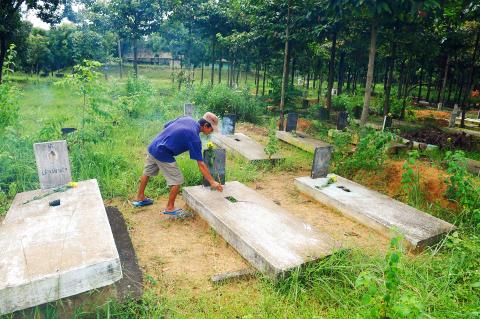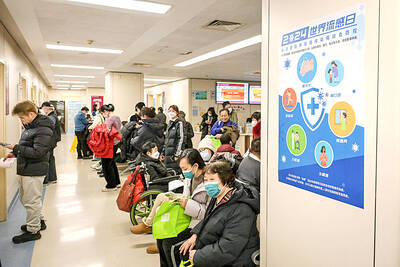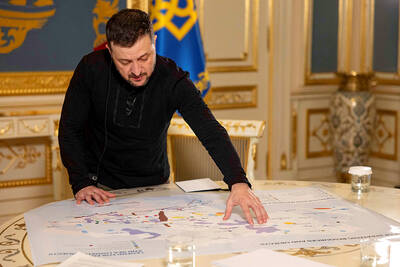Nearly four decades after the end of a war which divided Vietnam, a debate over national reconciliation between former foes has been rekindled by tensions with China.
Despite government policies designed to woo its wartime opponents — many of whom fled abroad — those linked to the old US-supported regime in the former South Vietnam still feel stigmatized by communist authorities.
However, recent anger at Beijing’s perceived aggression in South China Sea territory has led to unprecedented public recognition of southern fighters who stood up to the country’s giant northern neighbor.

Photo: AFP
Vietnam, which has a competing claim with China over sovereignty of the potentially oil-rich Paracel (西沙群島) and Spratly (西沙群島) island groups, has objected to what it described as Chinese harassment of its ships in the disputed waters.
The issue has stoked nationalist sentiment and in July protesters in Hanoi — the communist north’s historic heartland — held aloft the names of 74 South Vietnamese troops who died in a 1974 battle with Chinese forces in the Paracels.
CHANGE IN ATTITUDE
It was the first time “there was a kind of honor” for soldiers from the south, said Nguyen Xuan Dien, a Hanoi academic who joined the anti-China demonstrations, which were unusual in authoritarian Vietnam.
“I think that the state of Vietnam should have done that before the people,” said Le Hieu Dang, 67, an underground communist agent in South Vietnam during the war who now works with the Ho Chi Minh City Fatherland Front, a coalition of state-linked social and other organizations.
Inspired by the action in Hanoi, he and other intellectuals in Ho Chi Minh City, formerly Saigon, held their own tribute to all Vietnamese “who died for the territorial integrity of the nation” in battles against China.
A South Vietnamese navy veteran of the Paracels battle said this recognition was “a very good signal.”
“These people died protecting the country, not protecting the Saigon regime,” he said.
On the edge of Ho Chi Minh City lies a cemetery containing the graves of hundreds of South Vietnam’s war dead.
Communist military units based on the burial ground after the war were removed in recent years and the public has been allowed to mourn in private.
FADED MEMORIAL
However, the site bears scant resemblance to an official war memorial — occasional maintenance has not stopped tall grass from encroaching and while some graves are cared for and adorned with bright flowers, others are moss-covered and crumbling.
Nguyen Manh Hung, a former member of the Saigon government who fled to the US on the war’s final day in 1975, said authorities should turn the site into an official memorial that could attract former veterans.
“Whoever can pull this off and give a speech at the opening ceremony attended by respectable people on both sides of the conflict will have his place in history assured,” said Hung of George Mason University in Washington.
He said the nation cannot be genuinely reconciled as long as those who fought for the South continue to be portrayed as unpatriotic “American lackeys,” rather than fighters in what was “in a sense, a civil war.”
The country was divided into the communist North and US-backed South from the end of French colonial rule in 1954 until April 30, 1975, when northern forces over-ran Saigon.
Hundreds of thousands risked their lives to escape on boats when the war ended. They joined a Vietnamese diaspora that now numbers about 4 million, many of them in the US, Australia and Europe.
It took until 2004 for the government to recognize Vietnamese expatriates — called Viet Kieu — as an integral part of the nation.
As the country moves increasingly closer to its former US enemy, it has implemented policies aimed at wooing expatriate talent and capital including rights to property ownership, visa exemptions and dual nationality.
A government spokesperson said the measures apply to “all overseas Vietnamese regardless of whether they have worked for the previous regime or not,” adding that Viet Kieus contribute significantly to the country’s development.
However, Dang in Ho Chi Minh City said an unwritten law excludes those with links to the South Vietnamese government from Communist Party membership. This effectively prevents them from working in anything but the lowest levels of the civil service or the numerous state-owned companies.
LINGERING BIAS
An open letter to the government signed last month by 38 foreign-based Vietnamese scientists and other experts said there remained “widespread suspicion and distrust” of them within Vietnam’s leadership.
“The country and people of Vietnam are demanding that their leaders promote national strengths and unity amongst the entire people, inside and outside the country, to meet present dangers,” it said, referring to China.
Dang said it is imperative for both sides to work to overcome their suspicions, otherwise “we cannot create the strength” to counter Beijing’s power.
“The war has been over for more than 30 years, but the national reconciliation issue is still considered a burning one,” he said.

Thousands gathered across New Zealand yesterday to celebrate the signing of the country’s founding document and some called for an end to government policies that critics say erode the rights promised to the indigenous Maori population. As the sun rose on the dawn service at Waitangi where the Treaty of Waitangi was first signed between the British Crown and Maori chiefs in 1840, some community leaders called on the government to honor promises made 185 years ago. The call was repeated at peaceful rallies that drew several hundred people later in the day. “This government is attacking tangata whenua [indigenous people] on all

RIGHTS FEARS: A protester said Beijing would use the embassy to catch and send Hong Kongers to China, while a lawmaker said Chinese agents had threatened Britons Hundreds of demonstrators on Saturday protested at a site earmarked for Beijing’s controversial new embassy in London over human rights and security concerns. The new embassy — if approved by the British government — would be the “biggest Chinese embassy in Europe,” one lawmaker said earlier. Protester Iona Boswell, a 40-year-old social worker, said there was “no need for a mega embassy here” and that she believed it would be used to facilitate the “harassment of dissidents.” China has for several years been trying to relocate its embassy, currently in the British capital’s upmarket Marylebone district, to the sprawling historic site in the

A deluge of disinformation about a virus called hMPV is stoking anti-China sentiment across Asia and spurring unfounded concerns of renewed lockdowns, despite experts dismissing comparisons with the COVID-19 pandemic five years ago. Agence France-Presse’s fact-checkers have debunked a slew of social media posts about the usually non-fatal respiratory disease human metapneumovirus after cases rose in China. Many of these posts claimed that people were dying and that a national emergency had been declared. Garnering tens of thousands of views, some posts recycled old footage from China’s draconian lockdowns during the COVID-19 pandemic, which originated in the country in late

BACK TO BATTLE: North Korean soldiers have returned to the front lines in Russia’s Kursk region after earlier reports that Moscow had withdrawn them following heavy losses Ukrainian President Volodymyr Zelenskiy on Friday pored over a once-classified map of vast deposits of rare earths and other critical minerals as part of a push to appeal to US President Donald Trump’s penchant for a deal. The US president, whose administration is pressing for a rapid end to Ukraine’s war with Russia, on Monday said he wanted Ukraine to supply the US with rare earths and other minerals in return for financially supporting its war effort. “If we are talking about a deal, then let’s do a deal, we are only for it,” Zelenskiy said, emphasizing Ukraine’s need for security guarantees